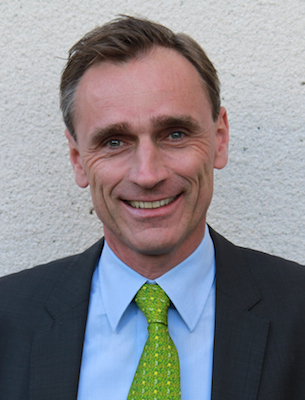

The right opportunities in the right location
The German-Mexican Chamber of Commerce and Industry (AHK Mexiko or CAMEXA) focuses on promoting cooperation between German and Mexican businesses and assisting German companies who are interested in or already involved in investing in the Mexican economy. We spoke with CAMEXA President Johannes Hauser about why investment in Mexico is becoming more popular, why German companies are being drawn there and what services the chamber offers.
 GSC: In its 2013 World Investment Report, the UN Council on Trade and Development surveyed representatives of transnational corporations and asked them to name their top destinations for FDI for 2013-2015. Mexico was listed as the 7th most popular destination named, it's first time appearing in the top 10 of that list. Why has Mexico become a more popular destination for FDI in recent years?
GSC: In its 2013 World Investment Report, the UN Council on Trade and Development surveyed representatives of transnational corporations and asked them to name their top destinations for FDI for 2013-2015. Mexico was listed as the 7th most popular destination named, it's first time appearing in the top 10 of that list. Why has Mexico become a more popular destination for FDI in recent years?
Johannes Hauser: Mexico is an extremely attractive investment location. The country has an open economy, macroeconomic stability, a sound legal framework and numerous free trade agreements. Currently, it has 10 free trade agreements with 45 different countries, including the U.S. and Canada, the countries of the European Union and Japan. The companies which comply with a pre-determined added value within the production process in Mexico are able to export customs-free or with favorable tariffs directly to partner countries or regions. Thus, the large number of free trade agreements provides firms located in Mexico with a privileged access to more than a billion consumers worldwide.
Furthermore, an additional location in the dollar area Mexico is quite advantageous for European companies, as it relativizes these firms' dependence on a single currency, the euro.
Mexico is also an interesting location for direct investment because of its low labor costs and geographic and strategic location in the vicinity of its neighbor and major trading partner, the USA.
Lastly, thanks to the good general conditions that exist in Mexico, in recent years a well-funded and well-educated middle class has emerged which increasingly demands premium consumer goods, among other wares. This thereby opens up new sales opportunities in the domestic market for foreign companies.
GSC: Some observers of Mexico's economy have noted that the country is benefitting from the practice of "nearshoring," in which companies move their production facilities closer to a domestic market (i.e., the United States). How much do you think Mexico's location relative to other markets is impacting its economic growth?
Johannes Hauser: The geographical position of Mexico is unmistakably an important driver for its economic growth. For years, the U.S. has been Mexico's number one trading partner; more than 77 percent of export goods produced in Mexico are exported to the United States.
The geographical proximity of the country coupled with the low level of wages makes the Mexican market particularly interesting for U.S. companies, especially for representatives of the automotive industry. Many American entreprises moved part of their production chain to Mexico and export locally produced semi-finished and finished goods back to the U.S. as well as to other countries in the world.
GSC: Last year, CAMEXA conducted a survey of its members and found that 61 percent were planning on reinvesting in Mexico in 2014; moreover, more than 80 percent of those surveyed were either planning on maintaining the same number of employees at their businesses or on hiring additional employees. Why are German companies specifically finding success in investing in Mexico? What's bringing them back to this market year after year?
Johannes Hauser: German direct investments in Mexico are enormous. For decades, German firms have been investing and reinvesting in the country; the accumulated amount is estimated to be around $30 billion USD. The Mexican Ministry of Economy reports that there are now around 1,300 businesses in Mexico with German capital participation.
Besides the factors already mentioned that make Mexico attractive as an investment location, German companies recognize and appreciate the market potential that this country offers. The great development of the automobile industry in particular, which is one of the strongest areas of the Mexican economy, has encouraged the settlement of new vehicle manufacturers and the expansion of production centers, which has always been a major draw for German suppliers.
These automobile producers in turn have significant demands for capital goods, which currently cannot be sufficiently met in Mexico. Machinery and other capital goods must therefore be in large part bought from abroad. Here, it is not just German investors located in Mexico who are calling on their trusted suppliers from Germany, but also American and Japanese manufacturers who are interested in German quality products.
GSC: What projects is the German-Mexican Chamber of Commerce and Industry currently working on to support business relations between the two countries?
Johannes Hauser: The main tasks of the German-Mexican Chamber of Commerce (AHK Mexiko) are the promotion of industrial and trade relations as well as the investment and technology transfer between Mexico and Germany. This includes the active promotion of Mexico as an investment location for German companies and the support of German entreprises that wish to enter the Mexican market. For this purpose, our chamber offers a wide range of services, including the search for potential business partners, assistance with site analysis and the organization of business delegations.
In the spring of this year, we organized a market exploration trip to Mexico for German technology and service providers in the mining and resources industry as well as two technology symposia, where German machine tool manufacturers presented themselves to potential customers and business partners on-site. Concerning the rest of the year, we are planning, among other things, exploration trips for the state of Thuringia to Mexico, a business delegation from the automotive supply industry in North Rhine-Westphalia, a delegation of German technology and service providers from the area of solar energy, as well as the organization of a German joint booth during the Mexican Petroleum Congress.
GSC: Thank you for speaking with us, Mr. Hauser.
More Information: www.mexiko.ahk.de
